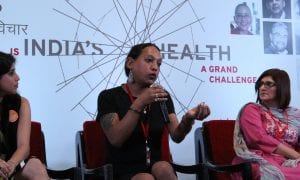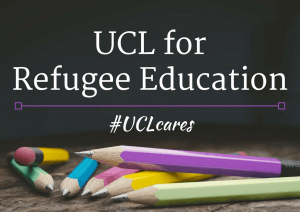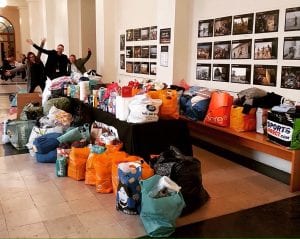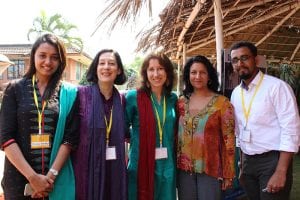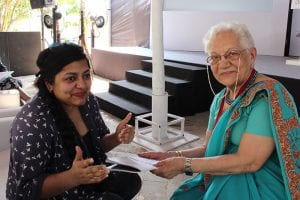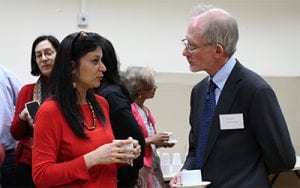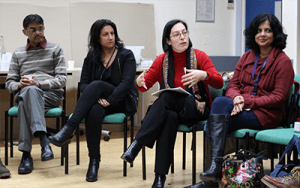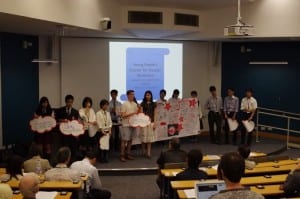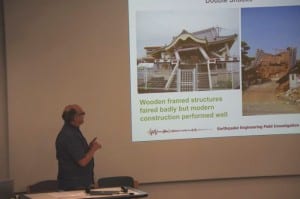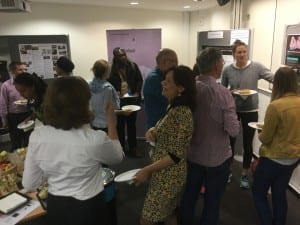Beyond Medicine: Difficult Dialogues 2017
By uclqjle, on 3 May 2017
Written by Ina Goel, research scholar at UCL and runs the hijra project
A public health system is a complex intersectional unit of people, institutions and resources determining the heath culture of a society. Prof. Debabar Banerjii explains health culture as an ecological approach that allows us to analyse epidemiology, cultural perceptions, health technologies and health behaviour within a country. At the recently held Difficult Dialogues conference, I got a chance to be a part of the shifting debates on India’s health culture. My panel was on gender and health, which looked at gendered determinants of health inequities in India. Key focuses were on issues related to gender-based violence, sexuality and access to reproductive and medical technologies.
As a social scientist who has spent the last seven years working with the hijra communities (trans communities known as third gender) in India, I was invited to draw on my experience of working in the field. I spoke about the gaps between the policy prescriptions and their implementation when it comes to accessing public health by the hijra communities. I got a chance to meet and interact with other experts in the field from journalism, academia and public policy that helped me strengthen my understanding in an interdisciplinary way. Difficult Dialogues gave me a platform to bring out the discrepancies between well-meaning policies and the living realities of hijra communities in India.
In April 2014, the Supreme Court of India declared that hijras be treated as the third gender. This landmark judgment gave affirmative action to hijras by adding them to the OBC (Other Backward Class) category, as a means of securing this quota. The Supreme Court further directed the Centre and State governments to urgently look into the problems faced by the hijra communities and made recommendations for providing proper medical care and separate public toilets for hijras. On one hand, the hijras are celebrated in Indian society because of their symbolism in representing several androgynous gods. On the other hand, the hijras are often victims of sexual harassment, abuse and rape, with no laws in place capable of dealing with a hijra rape complaint. Given their socially marginalised status and the prejudices hijras face, the issue of underreporting of crimes against hijras is perhaps understandable. There is also a refusal to accommodate and acknowledge the sexual identities of hijras because there is an anti-sodomy law in practice in India. This contradiction in law means that whilst hijras can officially be recognised as the third gender, it does not allow hijras to openly come out and truly live their lives. We thus have a system that fails to recognise the felt needs of hijras.
In India, many hijras are castrated. Often, it is believed that after castration, the hijra achieves nirwana or rebirth that earns the hijra the power to bless or curse other people. However, according to the Indian Penal Code, the legality of the practice of castration is under question and there is a lack of formal guidelines issued by the Medical Council of India regarding sex-reassignment surgery. Though there are some places that offer surgery to hijras at huge costs, many hijras do not have access to those facilities or the resources to sustain them. Given this constrained situation, many hijras are forced to go to quacks and faith healers to get themselves castrated. Little academic insight exists to address the issue of violence involved in castration given the centrality of the castration operation in hijra communities and the lack of proper routes to access it. Recognising violence as a social determinant to health is critical to understanding the health needs of hijra communities in India.
Resisting violence against hijras should be the first and foremost step that the Indian government should look into. Yes, a promise for a better hijra life is essential but aiming to provide separate public toilets for hijras in a country still struggling to deal with open defecation and manual scavenging might be a little too far-fetched for immediate implementation. For better outreach and improved accessibilities, public health policy makers should recognise the relationship between the living experiences of hijras and theoretical understanding of them. The big question remains the same: How do we ensure true equity for those who need it the most?
The theme for Difficult Dialogues 2018 is gender with the hope of finding better solutions to such difficult questions.
Photo: Rudrani (c) (hijra activist and founder of India’s first Transgender Modelling Agency)
References:
Banerji, D (1985): Health and Family Planning Services in India: An Epidemiological, Socio-cultural and Political Analysis and a Perspective, Lok Paksh, New Delhi
 Close
Close


